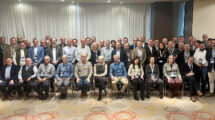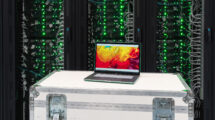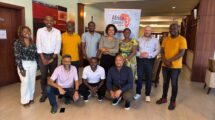For the 2023 GÉANT Project Symposium, the programme committee proposed 6 topics which it believed represent some of the most important areas of work that we should be focussing on as part of our future planning in GN5 and beyond. These were intended to be mostly thematic areas that would have an impact on all areas of project development and therefore attract an audience and discussion across all project members.
This series of blog posts gives an overview of those discussions but more importantly seeks to highlight and promote what happens next to ensure that these conversations keep happening and that we commit to the ideas shared in the rooms in Montpellier.
What was the topic for your session at the Symposium?
Cathrin Stöver, Hendrik Ike and Olaf Verschoor lead a discussion around geopolitics and sustainability. GÉANT is increasingly seen as a major delivery partner for the EC and with that role comes considerable responsibility: not only for the outcomes delivered but for the manner in which they are delivered. This means we need to not only be politically aware of important policy directions but also socially aware of how we are delivering these outputs.
Why is it important that GN5 members are thinking about this topic?
The GÉANT membership operates in a complex environment and represents diverse communities that will inevitably have different stand points. We have traditionally been a technology-driven community at a grassroots level, with policy discussions happening only in specific fora as needed. With the changing environment and changing role for GÉANT we now need a new level of policy understanding that is infused at all levels within our work. This also represents an opportunity to showcase our technical skill set within policy discussions: we need to be sure that we can future proof our ability to engage so we can be eligible for future funding programmes but also improve our salience for the EC.
For GÉANT, this means we have a lot of work to do to ensure that our members, work packages, community groups and projects have a greater awareness and understanding of policy work on a daily basis – such as understanding how each area of work we undertake links to strategy directives like the Digital Decade and the UN Sustainable Development Goals – and therefore showcasing our wider societal impact.
For the EC, the reach that GÉANT has is very attractive, however, the EC does not relate to the variability that comes with that reach. As GÉANT is unlikely to ever be a homogenous entity with a single voice, we need to make sure that we empower all of the voices that represent our community in our discussions and future commitments and continue to strive for consensus.
What were the main discussion points of your session?
The last few years have seen a number of geopolitical issues that are already having an effect on how we work. The most significant impacts of the last three years have been the challenges of Brexit, the global pandemic and sanctions by and against various countries. These issues have impacted each of our members differently and may require a different response locally, but require a combined approach within the GN project framework.
We also see challenges in interpreting EC policies within a global environment, as the geographical boundaries of legal models fail to map coherently to global services. Olaf highlighted the challenges of trying to meet the standards of a free and open economy versus the need to block certain suppliers to meet both sanction requirements and legitimate risks such as inflation threats and knowledge security.
A very real issue for both the EC and GÉANT is the impact of big tech and whether competition is still possible in a world where Microsoft has an R&D budget of over $24 billion. The EC is trying to manage Big Tech through policy, but various attempts have been less than successful as pointed out elsewhere in CONNECT. Increasing the voice that the R&E community has within technical fora and technical decision making is critical for our future role alongside our EC liaison role.
In terms of future-focus there are four main areas that we should be focusing on:
- Diplomatic Instability in terms of global instability and the impact of changes at the EC with the 2024 elections.
- Supply Shortages are already impacting our ability to effectively procure and support our network capacity and are expected to increase.
- Economic Downturns which will impact each of our members in varied ways.
- Climate Change and the need to demonstrate empirically our actions to address carbon emissions and our footprint.
What happens next? How will this conversation be continued?
Work has already begun to measure network power consumption with the aim of establishing a real-time power consumption tracker of network energy use. Alongside these numbers, we need a clear and coherent narrative of the value that GÉANT provides through its infrastructure.
Efforts to support this are being built into our procurement processes with emission sustainability scoring criteria for new tenders and new criteria for equipment material.
We also need to empower our NREN members with the language to have the conversations that are needed at a policy level and to ensure that representations that reflect all of our diverse needs are made. We need to show how our community contributes to the wider ambition of the EC and Member States and this is done by showing how we’re ready both with regards to service provision & societal needs.
You can help by keeping up-to-date with CONNECT – the policy team will be publishing regular updates such as the recent overview of the State of the Digital Decade Report and reaching out to the Policy Engagement Team.






